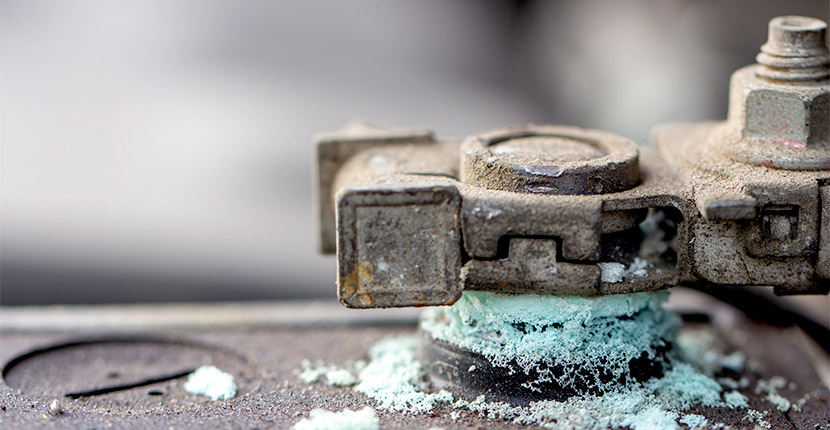What is Car Battery Corrosion and How Do You Prevent It?
Power - by Bryan Veldboom - updated on 11/26/2021

If you’re prone to looking under the hood of your vehicle, at some point you might have noticed a buildup of white, green or blue material on your battery terminals. This buildup is called corrosion and it can have a serious impact on your battery’s ability to start your car. So what does it mean when you have corrosion on your car battery? Keep reading for useful tips on what causes corrosion and what you can do to prevent it.
What Causes Battery Corrosion?
Corrosion can be caused by a number of different things. Lead acid auto batteries contain a number of different components that react with one another chemically in order to produce the electricity necessary to start your engine (for more info, read about How a Car Battery Works). As part of this process, the battery vents sulfuric acid vapor and hydrogen gas. These gasses react with the heat underneath your hood and the metal on the outside of the battery causing a chemical reaction with the lead alloy terminal. This is the most common cause of corrosion. Other causes of corrosion can include too much water in your battery’s electrolyte solution or overcharging the battery. It’s also very common for a battery to begin corroding as it gets older, particularly if it’s over five years old.
The color of the corrosive buildup can tell you a lot about what is causing your battery to corrode. White or gray corrosion is caused by a battery that’s leaking excessive battery acid due to a crack in the battery’s casing. A buildup of green material is caused by oxidation within the battery’s copper cable. Blue corrosion is copper sulfate which results when the copper terminal clamps are exposed to hot sulfuric acid.
What Problems Do Corroded Battery Terminals Cause?
Corrosion limits the amount of power than can travel from the battery to the engine and from the charging system back into the battery. This can make it difficult to start your engine and lead to premature failure of the battery due to inefficient recharging.
Corrosion can also occur when moisture makes its way into your vehicle’s electrical and power delivery system. This can damage electrical and other wiring systems, such as your vehicle’s air conditioning.
How Do You Prevent Car Battery Corrosion?
Batteries Plus offers a number of products that can help prevent your battery from corroding. Applying an anti-corrosion spray will coat the terminals in a soft protective coating that helps neutralize surface acids and salts. A battery terminal protector washer will absorb vapors at the base of the post and help prevent them from reaching the battery terminals.
If you use a charger on your battery, be sure that the voltage of the charger matches the voltage of your vehicle’s battery and that it’s compatible with your battery’s chemistry. If you do not have an automatic charger that shuts itself off when the battery reaches its optimum charge, you’ll also need to monitor the charging process to make certain that it isn’t overcharging the battery.
Batteries Plus Offers Free Battery Testing
If your battery keeps corroding or you’re experiencing problems turning over your engine, stop by your nearest Batteries Plus and have it tested for free. Need a replacement? Shop our selection of car and truck batteries online or in store and be sure to take advantage of our free installation service (good at most locations on most vehicle makes and models). Plus, we offer a selection of additional essentials in our Automotive Center.

